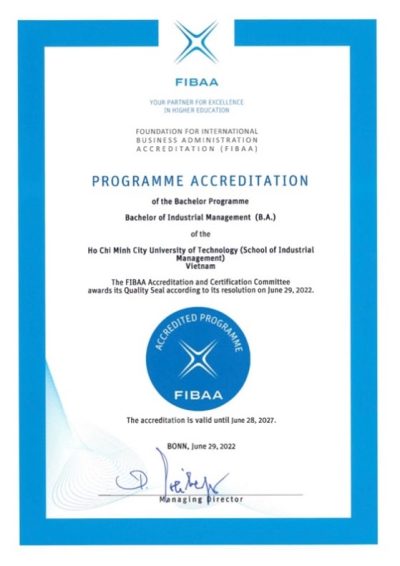PROGRAM GENERAL GOALS
The graduates will have a solid understanding of the key business areas, system thinking and critical thinking skills. The graduates will demonstrate analysis, decision-making and problem-solving abilities in the operations and management in the areas of production/ service or business. The graduates will be able to self-learn, innovate and adapt through practical work
PROGRAM SPECIFIC GOALS
PROGRAM GENERAL GOALS
The graduates will have a solid understanding of the key business areas, system thinking and critical thinking skills. The graduates will demonstrate analysis, decision-making and problem-solving abilities in the operations and management in the areas of production/ service or business. The graduates will be able to self-learn, innovate and adapt through practical work
PROGRAM SPECIFIC GOALS
The Bachelor in Industrial Management program aims to provide society with a highly competent workforce for industrial and service sectors. The graduates typically work in the following sectors:
Students who graduated from the program are also qualified for continuing their studies at higher levels, with a focus on management.
As a faculty of HCMUT, SIM aims to promote interdisciplinary training, bridging between technology and management knowledge blocks. SIM is committed to building an intellectual environment with high-quality standards in teaching, research, and learning towards regional and international integration. With nearly 60 lecturers, most of whom were graduated from overseas, the school promotes high-quality scientific research and innovations to meet the education demands.
A great learning process with opportunities to access various platform knowledge from marketing, production management, management information systems, finance or personnel will help you develop skills in Analysis and Management in all areas.


In order to promote the quality assurance within regional universities, AUN has launched an initiative to assess the quality of higher education according to the standard quality assurance standards of the ASEAN region (ASEAN University Network – Quality Assurance, abbreviated is AUN-QA).
This is also a way that the ASEAN Network of Universities enhances mutual trust in the quality of training between regional universities and partner universities around the world, step by step contributing to promoting The Recognization of the achievement of learning and The development cooperation between universities in Southeast Asia.
With strives in improving the quality of training, facilities..etc.. The School of Industrial Management has been honored to receive AUN-QN quality certification.
In 2022, the Faculty of Industrial Management also underwent accreditation of its curriculum according to the FIBAA (European) standards and received FIBAA certification. This reaffirms the reputation and quality of education provided by the Faculty of Industrial Management, which is now recognized internationally. Graduates from this faculty have excellent employment opportunities and can enter the global job market with confidence.
With two industrial management majors and business administration, the School of Industrial Management wants to give you interesting and quality learning experiences.
